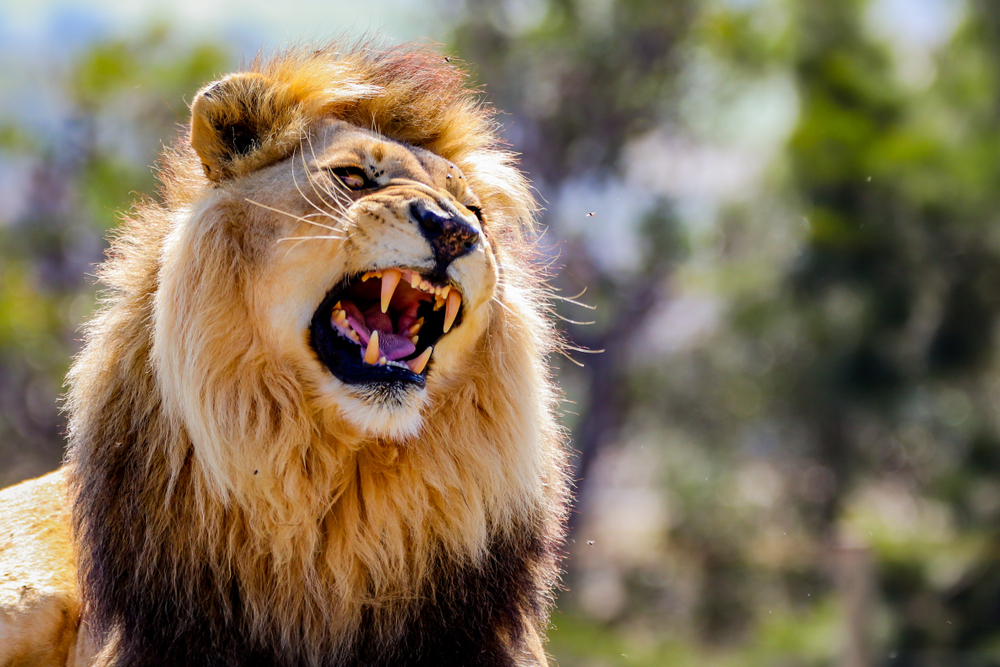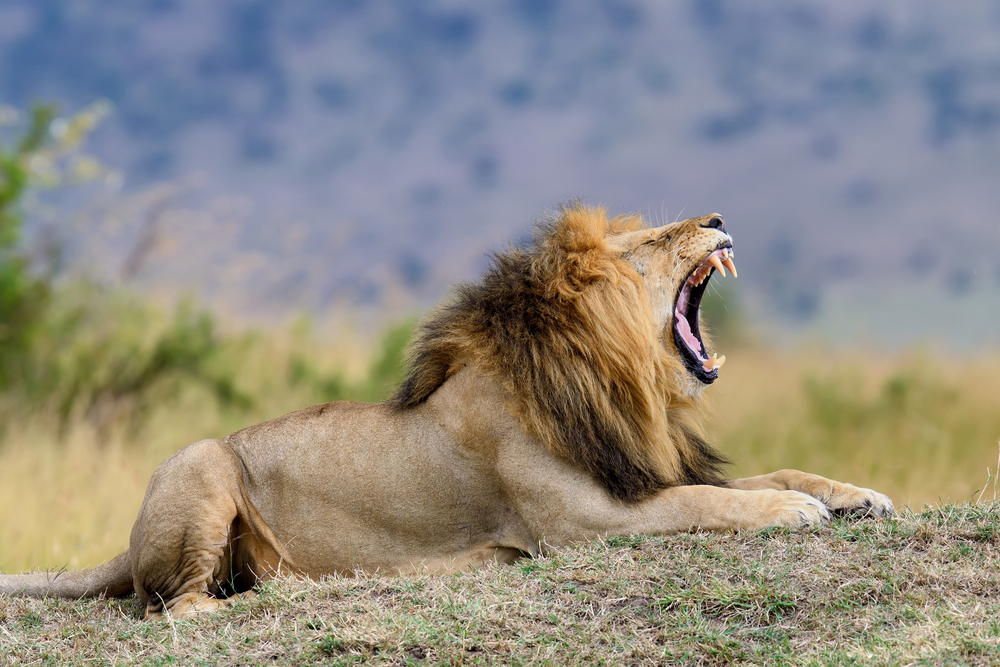Lions have the loudest roar of all the big cats. The roar is so loud it can be heard up to 5 miles away and reaches 114 decibels (at a distance of around one meter). To put that into perspective, the human pain threshold is at around 110 decibels. So, standing too close to a roaring lion could not only send shivers down your spine but also be physically painful.
Lions are not the only animals that roar. Others, like tigers, jaguars, and leopards, roar too. That’s not a coincidence, seeing all these species belong to the Panthera genus. But the question is, why do these big cats roar, and what does it tell us?
Lions produce loud roars primarily due to the unique characteristics of their vocal folds or vocal cords in their larynx (voice box). In many species, the vocal folds are more triangular in shape and protrude into the animal’s throat. But in lions, the protrusions are flat and square in shape, thanks to the fat depositions deep within the vocal cord ligament.
When a lion roars, air from its lungs is pushed through the larynx and over the vocal folds. The square shape of the vocal folds helps maintain a larger surface area for vibration. This increased surface area allows for more significant vocal fold vibrations. It also effectively stabilizes the vocal folds, enabling them to vibrate in a controlled and consistent manner. As a result, lions can produce powerful sound waves without needing to exert excessive force on their lungs. Lions roar as loud as 114db, which is about 25 times louder than a gas-powered lawn mower.

Lions have the loudest roar among all the big cats, and their roars serve multiple important purposes, including:
Lions are highly territorial animals, and they need a defined space in which to hunt, raise their cubs, and find food and water. Roaring helps them establish and defend these territories. When lions roar, they are essentially telling other lions, "This area belongs to us."
Lions from a neighboring pride or solitary males who wander too close to a pride's territory can hear the roars. These loud vocalizations act as a warning sign, indicating that they are entering another lion's domain. It helps prevent confrontations with a lion pride, which are often deadly.
Lions live in a pride, which is a social group that works together for various activities, including hunting. Roaring helps coordinate their actions and reunite separated members. During hunts, lions often spread out to surround and ambush prey. Roaring helps them stay in touch with one another, ensuring they remain coordinated throughout the hunt. If one lion makes a successful kill, its roars can signal others to come and share in the feast.
Male lions use their roars to announce their presence and availability to potential mates. A powerful roar signals their strength and ability to protect and provide for a pride and their offspring. A roaring male can attract the attention of nearby lionesses in estrus (the receptive period of the female's reproductive cycle). The louder and more resonant the roar, the more likely it is to draw the interest of potential mates. In a pride with multiple males, roaring can also be a way for males to assert dominance over one another and vie for the attention of females.
Roaring can serve as a way to maintain social bonds within the pride. It's a means of expressing excitement comfort, or simply making predator calls. Lions can also roar when stressed, agitated, or feeling threatened. In other cases, roaring can help coordinate activities other than hunting, such as moving to a new location or interacting with pride members.

The roars of lions contribute significantly to the care and conservation efforts at Lion Tigers & Bears (LTB). Here’s a quick look at how our team leverages these vocalizations for the well-being of these big cats and their broader conservation:
The vocalizations of lions and tigers serve as important indicators of their health and emotional states. LTB's dedicated team of caretakers and veterinarians can listen to and analyze the roars to assess the animals' physical and mental well-being. Any changes in the frequency, duration, or tone of their vocalizations can signal potential health issues, stress, or discomfort. This allows for prompt medical intervention and adjustments to their care routines to ensure their optimal health.
Big cats communicate through vocalizations, including roars, to express emotions, establish social hierarchies, and respond to their environment. According to research published in Bioacoustics, these roars are unique to each lion. Our team closely observes and interprets these vocalizations to gain insights into carnivore behavior and emotional state. This information helps us tailor their care, address specific needs, and create a more enriching environment.
Roars are also essential for understanding social interactions, especially in scenarios where multiple big cats share enclosures. Roaring can indicate dominance, submission, territorial disputes, or even mating behaviors. Monitoring these vocal interactions helps our team ensure that the animals coexist harmoniously and minimize conflicts that may arise in shared spaces.
Sharing the vocalizations of big cats with our sanctuary visitors and the public is an essential part of our educational mission. It offers a unique opportunity for visitors to connect with these animals and learn about their natural behaviors, communication, and conservation needs. Raising awareness through public engagement is crucial for garnering support for the sanctuary's mission and broader conservation efforts.
The roars of lions, tigers, and other big cats are not just powerful sounds that echo through the sanctuary at Lions Tigers & Bears (LTB). They are a language, a window into the souls of these magnificent animals. These vocalizations provide crucial insights into animal behavior, health, social interaction, and emotional well-being. At LTB, our dedicated team harnesses the power of these roars to ensure the highest standards of care and to contribute to the conservation of these endangered species.
But our mission goes beyond the sanctuary gates. It extends to a world where lions and tigers face increasing threats in the wild, from natural habitat loss to poaching. It's a world where the urgent need for conservation is evident.
You can be a part of this mission, a voice for these majestic animals. Your support, in the form of a donation to Lions Tigers & Bears, can make a real difference. It helps us provide better animal care, engage in conservation efforts, and educate the public about the critical importance of protecting these species.
Join us in our commitment to safeguarding the future of lions, tigers, and bears. Let the roar of your generosity be heard around the world. Visit our website, learn more about our work, and consider making a donation today. Together, we can ensure that these incredible animals continue to roar for generations to come.